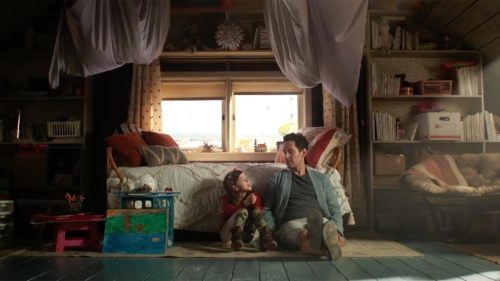Truth Through Pastiche In DOWN WITH LOVE And FAR FROM HEAVEN
Ant-Man and the Wasp is almost here. Get your tickets now!
The years of 2002-2003 were pretty great for post-modern homages to Rock Hudson films. Those two years saw the release of Todd Haynes’s moving remix of Douglas Sirk melodramas, Far From Heaven, and Peyton Reed’s Down With Love, a wild and blisteringly funny pastiche of the Rock Hudson and Doris Day sex comedies. Both works play up and sometimes subvert the tropes and typically sanguine nature of their respective genres to make their point, gradually peeling back layers of winking pastiche to reveal a truthful, sincere core. Down With Love and Far From Heaven are fixated on notions of facades and the truth, approaching issues that wouldn’t typically be addressed in the types of films that they’re parodying. That said, there’s a significant gap in the issues that they’re tackling, and the extent to which they face those issues head-on.
Awash with lush autumnal colours and backed by a sweeping musical score, Far From Heaven adopts the style of Douglas Sirk’s social melodramas, specifically All That Heaven Allows (which also has a woman fall in love with her gardener, Rock Hudson), to confront the reality of living as a marginalised person in that decade. Haynes goes on to explore the homophobia, racism and segregation of the same era, replacing typical melodrama plots with themes that might have been considered more taboo, as the affluent housewife Cathy (Julianne Moore) falls in love with her black gardener Raymond (Dennis Haybert). The film subverts expectations early on, opening with overwrought music and a garish title, suggesting a more winking, playful riff on melodrama. It is soon clear that this isn’t the case. Cutesy language (a kid quite literally says ‘aw shucks’) and chirpy neighborly affection soon gives way to hateful, withering looks.
Down With Love is a bit more concerned with playing around with the aesthetic and mocking the attitudes of the era, its characters being either absurd, sleazy journalists who arrive in the movie hanging from a helicopter, or a feminist author who has to appeal to a room full of old, grey-suited men who only refer to each other by their initials. The aforementioned journalist is Catcher Block, a “lady’s man, man’s man, man about town” and playboy (Ewan McGregor, styled to sort of resemble Rock Hudson), who clashes with rising star and feminist author Barbara Novak (Renée Zellweger) over the release of her book Down With Love, a book that proclaims that women should do away with love, focus on their careers, and enjoy “sex a la carte”.
The book becomes a hit, and Novak ruins Block in the process, and the games begin, as Block plans to romance Novak in order to prove her a hypocrite in a plot straight out of Pillow Talk, posing as an innocent Southern astronaut, ‘Major Zip Martin’. There’s plenty to enjoy: the nods to screwball comedies and sex comedies, the grandiose, pastel coloured '60s deco and a variety of insane hats, even a musical number. Reed eventually tells us that all this is in service of the film’s biggest trick - revealing that events of the film have almost been entirely under Novak’s control, in a wonderful monologue shot in an unbroken take. Down With Love could be accused of having its cake and eating it, gleefully reveling in Block’s gross and ridiculous plot before leading to this final, even more absurd rug pull, but the film’s self-awareness, and Zellweger’s excellent performance, makes it work.
This insane twist leads to what might be the most utopian ending possible for a romantic comedy of this nature, as seemingly every woman who is a secretary or assistant in Manhattan quits their job to go and work for Novak, the ultimate happy ending for the film not being marriage and children as in Pillow Talk, but instead, equal footing.
Along the way to this point, Reed jabs at ideas that aren’t just a reflexive look at the attitudes that accompanied these types of films, but also ones that are relevant today, such as capitalist co-opting of progressive messages, when Novak’s book idea is ignored until it sells. In its first act Down With Love presents institutionalised sexism in a similar fashion to how Far From Heaven presents racism; it’s overwhelming, and everywhere, with any woman aspiring to be more than someone’s assistant mostly shut out. Once Novak’s book comes out, the film mines plenty of comedy out of the change in these backwards gender roles, right down to the couple who run Novak’s local laundromat.
While there’s something of a gulf between these two films in how deep they dig into the attitudes of the era, both are strong reminders that ‘realism’ doesn’t inherently mean something is more truthful, and that there’s still plenty of value to be found in adapting, parodying and remixing what came before.



